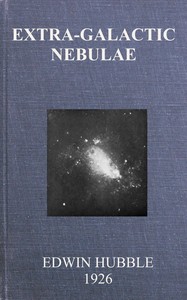Extra-galactic nebulae by Edwin Hubble
"Extra-galactic Nebulae" by Edwin Hubble is a scientific publication written in the early 20th century. This work primarily focuses on the detailed classification and statistical investigation of extra-galactic nebulae, which are celestial formations distinct from those within our Milky Way galaxy. Hubble delves into the characteristics and distribution of these nebulae, making pivotal observations that contributed to our understanding of the cosmos. The opening of "Extra-galactic Nebulae" presents an abstract and introduction
to the study, emphasizing a statistical analysis of 400 extra-galactic nebulae, observed and classified according to their visual magnitudes and structural forms. The classification reveals that approximately 97% of the nebulae exhibit regular forms, reflecting rotational symmetry around dominating nuclei, while a small fraction appears irregular in structure. Hubble discusses the relationships between luminosity, apparent size, and distance, providing a foundation for the subsequent detailed classification of different types of nebulae, which includes elliptical, spiral, and irregular categories, suggesting that these classifications may correspond to different evolutionary phases of astronomical bodies. (This is an automatically generated summary.)
Read now or download (free!)
| Choose how to read this book | Url | Size | ||||
|---|---|---|---|---|---|---|
| Read online (web) | https://sendtokindle.compellingsciencefiction.com/ebooks/68428.html.images | 220 kB | ||||
| EPUB3 (E-readers incl. Send-to-Kindle) | https://sendtokindle.compellingsciencefiction.com/ebooks/68428.epub3.images | 1.8 MB |
Send
to kindle email: |
|||
| EPUB (older E-readers) | https://sendtokindle.compellingsciencefiction.com/ebooks/68428.epub.images | 1.8 MB | ||||
| EPUB (no images, older E-readers) | https://sendtokindle.compellingsciencefiction.com/ebooks/68428.epub.noimages | 255 kB | ||||
| Kindle | https://sendtokindle.compellingsciencefiction.com/ebooks/68428.kf8.images | 2.9 MB | ||||
| older Kindles | https://sendtokindle.compellingsciencefiction.com/ebooks/68428.kindle.images | 2.8 MB | ||||
| Plain Text UTF-8 | https://sendtokindle.compellingsciencefiction.com/ebooks/68428.txt.utf-8 | 134 kB | ||||
| Download HTML (zip) | https://www.gutenberg.org/cache/epub/68428/pg68428-h.zip | 2.1 MB | ||||
| There may be more files related to this item. | ||||||
About this eBook
| Author | Hubble, Edwin, 1889-1953 |
|---|---|
| Title | Extra-galactic nebulae |
| Original Publication | United States: The University of Chicago Press,1926. |
| Note | Reading ease score: 68.5 (8th & 9th grade). Neither easy nor difficult to read. |
| Credits | Anonymous (This book was produced from images made available by the HathiTrust Digital Library.) |
| Language | English |
| LoC Class | QB: Science: Astronomy |
| Subject | Milky Way |
| Subject | Nebulae |
| Category | Text |
| EBook-No. | 68428 |
| Release Date | Jun 30, 2022 |
| Copyright Status | Public domain in the USA. |
| Downloads | 147 downloads in the last 30 days. |
| Project Gutenberg eBooks are always free! | |

